#the international journal of human relations
Photo
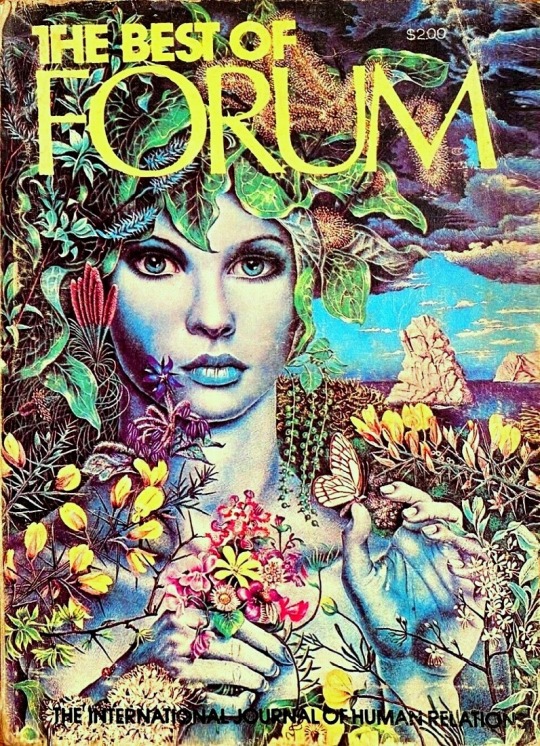
The Best of FORUM, The International Journal of Human Relations - Volume 2, Number 7, April 1973 (cover illustration by Pierre Lacombe)
#witches#forenses#occult#vintage#forum magazine#the best of forum#the international journal of human relations#international journal#human relations#april 1973#1973#pierre lacombe
24 notes
·
View notes
Text
Putin runs out of weapons of mass disruption
In a world where the line between reality and satire is increasingly blurred, we find ourselves in the midst of a geopolitical drama that could give any Netflix series a run for its money. Let’s dive into the latest episode of “As the World Burns.”Our story begins with Russian President Vladimir Putin, who, in a surprising twist, admits that his forces are running low on weapons and drones. It’s…

View On WordPress
#Belarus#bombs#communications-equipment#dailyprompt#disinformation#drones#false-narratives#Geopolitics#Human Rights#International Relations#Journalism#land#lies#missiles#nuclear#Politics#Putin#Realestate#Russia#Ukraine#victims#war#wars#weapons
0 notes
Text
Lest We Forget the Douma Cover-Up Scandal: Where OPCW's Credibility Takes a Hit
The Douma cover-up scandal refers to the alleged attempt by the Syrian government and Russian officials to cover up a chemical weapons attack that took place in Douma, Syria in April 2018. The attack, which was widely attributed to the Syrian government, reportedly killed dozens of people and prompted a retaliatory missile strike by the United States, France, and the United Kingdom. However,…

View On WordPress
#Aaron Maté#Chemical Attack#Chemical Weapons#Cover-up#Douma Cover-up Scandal#France#Human rights#Independent Journalism#International Relations#Investigative Journalism#Middle East#OPCW#politics#Syria#UK#UN#UN Security Council#US#War Crimes
0 notes
Text
BBC journalist 'beaten and kicked by the police' as protests spread across China | CNN Business
BBC journalist ‘beaten and kicked by the police’ as protests spread across China | CNN Business
CNN Business
—
Edward Lawrence, a journalist at the BBC, was arrested by police in Shanghai at the scene of protests on Sunday night, according to the BBC and as captured on what appears to be mobile phone footage of the arrest.
While he has since been released, a BBC spokesperson has expressed extreme concern about his treatment, saying he was “beaten and kicked by the police.”
Protests…

View On WordPress
#Arrests#asia#bbc#Business#business and industry sectors#China#civil disobedience#companies#continents and regions#Crime#criminal law#east asia#economy and trade#freedom of press#Human rights#international relations and national security#journalism and news media#law and legal system#law enforcement#law enforcement and corrections#media industry#policing and police forces#Protests and demonstrations#society
0 notes
Text
How the kleptocrats and oligarchs hunt civil society groups to the ends of the Earth
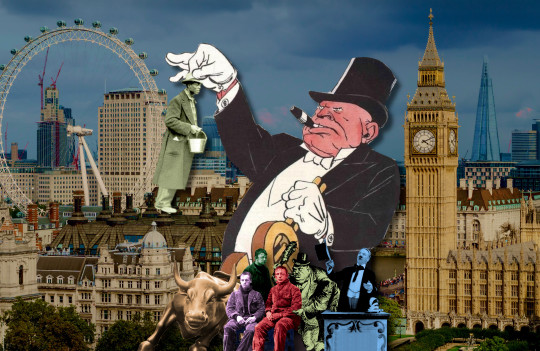
It's a great time to be an oligarch! If you have accumulated a great fortune and wish to put whatever great crime lies behind it behind you, there is an army of fixers, lickspittles, thugs, reputation-launderers, procurers, henchmen, and other enablers who have turnkey solutions for laundering your reputation and keeping the unwashed from building a guillotine outside the gates of your compound.
The field of International Relations has studied the enemies of the Klept in detail: the Transnational Activist Network is a well-documented phenomenon. But far more poorly understood is the Transnational Uncivil Society Network, who will polish any turd of sufficient wealth to a high, professional gloss.
These TUSNs are the subject of a new, timely scholarly paper by Alexander Cooley, John Heathershaw and Ricard Soares de Oliveira: "Transnational Uncivil Society Networks: kleptocracy’s global fightback against liberal activism," published in last month's European Journal of International Relations:
https://ora.ox.ac.uk/objects/uuid:5e5a3052-c693-4991-a7cc-bc2b47134467/download_file?file_format=application%2Fpdf&safe_filename=Cooley_et_al_2023_transnational_uncivil_society.pdf&type_of_work=Journal+article
The authors document how a collection of institutions – some coercive, others organized around good works – allow kleptocrats to take power, keep power, and use power. This includes "wealth managers, company providers, accounting firms, and international bankers" who create the complex financial structures that obscure the klept's wealth. It also includes "second citizenship managers and lawyers" that facilitate the klept's transnational nature, both to provide access to un-looted, prosperous places to visit, and boltholes to escape to in the face of coup or reform. It includes the real-estate brokers and other asset facilitators, who turn whole precincts of the world's greatest cities into empty safe-deposit boxes in the sky, while ensuring that footlose criminal elites always have a penthouse to perch in when they take a break from the desiccated husks they've drained dry back home.
Of course, it also includes the PR managers and philanthropic ventures that allow the klept to launder their reputation, to make themselves synonymous with good deeds rather than mass murder. Think here of how the Sacklers used charity to turn their family name into a synonym for culture and fine art, rather than death by opioid overdose:
https://pluralistic.net/2023/08/11/justice-delayed/#justice-redeemed
Beyond providing comfort to "Politically Exposed Persons" and "High Net-Worth Individuals," TUSNs are concerned with neutralizing TANs. Activists in these transnational networks play an inside-outside game: in-country activists will recruit peers abroad to bring attention to the crimes of their local kleptocrats. These overseas partners target the klept in the places they go to play and spend, spoiling their fun – and if they succeed in getting corrupt leaders censured abroad, then in-country activists can leverage that bad press to fight the klept at home.
To fight this "Boomerang Effect," TUSNs seek to burnish corrupt officials' reputations abroad, getting their names on humanitarian prizes, beloved sports teams, cultural institutions and great universities. They seek to capture international governance institutions that might wrong-foot kleptocrats, co-opting them to enable and even celebrate looters.
When it comes to elite philanthropy, TUSNs are necessarily selective. Kleptocrats' foundations don't fund anti-kleptocratic groups – they stick to "education, public health, the environment and the arts." These domains steer clear of human rights questions that might implicate their benefactors. Russian oligarchs love children's charities and disability rights – provided they don't target the Russian state.
If charitable giving is reputation laundering's carrot, then "reputation management" is the laundry's stick. Think of organized copyfraudsters who clone websites that have criticized their clients, then backdate the articles, then accuse the originals of infringing copyright in order to get them de-listed from Google or taken offline altogether:
https://pluralistic.net/2021/04/23/reputation-laundry/#dark-ops
Reputation managers also spend a lot of time in court. In the UK – the world's leader in libel tourism, thanks to a legal system designed to let posh monsters sue muckraking journalists into silence – Russian oligarchs have perfected the art of forcing their critics to shut up and go away:
https://pluralistic.net/2022/03/04/londongrad/#enablers
Indeed, London is a one-stop shop for the global klept, a place were forelock-tugging Renfields will buy you a Mayfair mansion under cover of a numbered company, sue your critics into silence, funnel your money into an anonymous Channel Islands account:
https://pluralistic.net/2022/01/07/the-klept/#pep
They'll sell you whole galleriesworth of "fine art" that you can have relocated to a climate-controlled container in a Swiss or Irish freeport:
https://pluralistic.net/2020/07/14/poesy-the-monster-slayer/#moneylab
They'll give your thick-as-pigshit progeny a PhD and never check to see whether he wrote his thesis himself:
https://en.wikipedia.org/wiki/LSE%E2%80%93Gaddafi_affair
Then they'll hook you up with a cyber-arms dealer to hunt your enemies by capturing their devices:
https://pluralistic.net/2021/07/27/gas-on-the-fire/#a-safe-place-for-dangerous-ideas
But don't let Brexit stop you from shopping for bargains on the continent. The Golden Passports of the EU – available in a variety of flavors, from Maltese to Cypriot to Portuguese – offer the discerning failson access to the luxury good shops and fleshpots of 27 advanced economies, making it a favorite of the Khmer Riche – the junior klept of Cambodia's ruling faction:
https://www.reuters.com/investigates/special-report/cambodia-hunsen-wealth/
But golden passports are for amateurs. Skilled klepts travel on diplomatic passports, which offer the twin benefits of free movement and consequence-free criminality, thanks to diplomatic immunity. The former Kazakh dictator's son-in-law enjoyed a freewheeling diplomatic life in Vienna; one daughters of the dictator of Tajikistan had a jolly time as an envoy to DC; another, to London (where else?).
All this globetrotting serves a second purpose: when rival elites seize power back home and force the old guard into exile, those ex-monsters can show up in the lands they called their second homes and apply for asylum. It turns out that even bomb-the-boats UK will welcome any asylum seeker who enters via the private jet terminal at City Airport (to be fair, these "refugees" have extensive properties in Zone 1 and country places in the Home Counties, so they won't need housing).
This stuff works. After Kazakh state goons murdered at least 14 protesters at a Zhanaozen oil facility in 2011, human rights groups around the world took up the cause. But they were effectively neutralized by TUSNs, with former UK PM Tony Blair writing on behalf of the Kazakh government to the EU condemning any kind of international investigation into the mass killings (add "former Prime Ministers" to the list of commodities for sale in the UK to sufficiently well-resourced murderer).
The authors close their paper with two case-studies. The first is of the daughters of Uzbek dictator Islam Karimov, Gulnara and Lola. And President Karimov was indeed a dictator: he trapped his population within his borders, forced them to use unconvertible scrip in place of money, and ordered the murder of hundreds of peaceful protesters, plunging the country into international isolation.
But while Uzbeks were sealed within their borders, Gulnara Karimov became an international player, running a complex network of businesses that mixed the products of the nation's oilfields with her family's fortune. She solicited – and received – bribes from Teliasonera, MTS and Vimpelcom, who were all vying for the contract to provide service in Uzbekistan. All told, she extracted more than $1b in bribes, laundering them through Latvia, Hong Kong and New York. She acquired real-estate in France and Switzerland, and her spree continued until her father collaborated with Uzbek security to seize her assets and place her under house-arrest.
Lola Karimova-Tillyaeva was Gulnara's estranged younger sister. She and her husband Timur Tillyaev ran the Dubai-based SecureTrade, which did extensive business with "opaque Scottish Limited Partnerships," laundering more than $127m in a single year to offshore accounts in the UAE and Switzerland. They acquired many luxe assets – a jet, a Californian villa, and an LA perfumier.
Lola styled herself as the face of the Karimovas abroad, a "philanthropist and cultural ambassador." She was a UNESCO ambassador and commissioned works of monumental art – and also sued the shit out of news outlets that reported factual matters about her family repressive activity at home. She organized AIDS charities in the name of Uzbekistan – even as her father was imprisoning a writer for publishing a book explaining how to have safer sex.
The second case-study is on Isabel dos Santos, "Africa's richest woman," daughter of Angolan dictator Jose Eduardo dos Santos. Isabel's vast fortune stemmed from her personal capture of vast swathes of the third-largest economy in Africa: "telecommunications, banking, diamonds, real estate and cement, among many others." Isabel enjoyed seemingly limitless access to state credit and co-investment, and was given first crack at newly deregulated industries. Foreign firms that invested in Angola were required to "partner" with Isabel's businesses.
Isabel claimed to be a "self-made woman" – a claim credulously parroted by the western press, including the FT. She used her homegrown fortune to become a major player abroad, especially in Portugal, where she was represented by the leading Portuguese law-firm PLMJ. Her enablers are who's who of corruption-loving lickspittles: McKinsey, Ernst and Young, Boston Consulting Group, and the Spanish BigLaw firm Uri Menendez.
Isabel cultivated a public facade of philanthropic giving and public spirited activism, serving as head of the Angolan Red Cross. She attended Davos and spoke at the LSE (she was also invited to Oxford, but her invitation was subsequently rescinded). On social media, she dismissed critics of her wealth and corruption as "colonialists," decrying their "racism" and "prejudice."
Isabel dos Santos's corrupt sources of wealth were finally, irrefutably exposed through the Luanda Leaks, in which the International Consortium of Investigative Journalists mapped the network of "top banks, management consultants and legal firms that were central to dos Santos’s operations."
Both case studies shed light on the network of brilliant, driven enablers and procurers without whom the world's greatest monsters would falter. It's a rare window on a secretive world, one that is poorly understood even by its inhabitants. As Michael Mechanic wrote in Jackpot, his 2021 book on vast, intergenerational fortunes, the winners of the lucky orifice lottery often lack any real understanding of how The Money is structured, grown and protected:
https://pluralistic.net/2021/04/13/public-interest-pharma/#affluenza
This point was reiterated by Abigail Disney, in a brave piece on what it's like to grow up subject to the oversight of these millionaires who babysit the children of billionaires:
https://pluralistic.net/2021/06/19/dynastic-wealth/#caste
This is an important contribution to the literature. We naturally focus on the ultrawealthy individuals whose reputations and fortunes are the subject of so much attention, but without the TUSNs, they would be largely helpless.

Going to Burning Man? Catch me on Tuesday at 2:40pm on the Center Camp Stage for a talk about enshittification and how to reverse it; on Wednesday at noon, I'm hosting Dr Patrick Ball at Liminal Labs (6:15/F) for a talk on using statistics to prove high-level culpability in the recruitment of child soldiers.
On September 6 at 7pm, I'll be hosting Naomi Klein at the LA Public Library for the launch of Doppelganger.
On September 12 at 7pm, I'll be at Toronto's Another Story Bookshop with my new book The Internet Con: How to Seize the Means of Computation.

If you'd like an essay-formatted version of this post to read or share, here's a link to it on pluralistic.net, my surveillance-free, ad-free, tracker-free blog:
https://pluralistic.net/2023/08/24/launderers-enforcers-bagmen/#procurers

Image:
Sam Valadi (modified)
https://www.flickr.com/photos/132084522@N05/17086570218/
CC BY 2.0:
https://creativecommons.org/licenses/by/2.0/
--
Colin (modified)
https://commons.wikimedia.org/wiki/File:Palace_of_Westminster_from_the_dome_on_Methodist_Central_Hall_(cropped).jpg
CC BY-SA 4.0
https://creativecommons.org/licenses/by-sa/4.0/deed.en
#international relations#ir#enablers#consiglieri#lickspittles#plutes#guillotine watch#politically exposed persons#peps#high net work individuals#hnwis#oligarchs#reputation laundering#spyware#renfields#big law#uk#kleptocrats#transnational activist networks#tans#civil society#ngos#transnational uncivil society networks#tusns#slapps#Uzbekistan#Gulnara Karimova#Isabel dos Santos#angola#corruption
2K notes
·
View notes
Text
"A global shift to a mostly plant-based “flexitarian” diet could reduce greenhouse gas emissions and help restrict global heating to 1.5C, a new study shows.
Previous research has warned how emissions from food alone at current rates will propel the world past this key international target.
But the new research, published in the Science Advances journal, shows how that could be prevented by widespread adoption of a flexitarian diet based around reducing meat consumption and adding more plant-based food.
“A shift toward healthy diets would not only benefit the people, the land and food systems,” said Florian Humpenöder, a study author and senior scientist at the Potsdam Institute for Climate Impact Research, “but also would have an impact on the total economy in terms of how fast emissions need to be reduced.” ...
The researchers found that adopting a flexitarian diet could lower methane and nitrous oxide emissions from agriculture and lower the impacts of food production on water, nitrogen and biodiversity. This in turn could reduce the economic costs related to human health and ecosystem degradation and cut GHG emissions pricing, or what it costs to mitigate carbon, by 43% in 2050.
The dietary shift models also show limiting peak warming to about 1.5C can be achieved by 2045 with less carbon dioxide removal, compared with if we maintain our current diets.
“It’s important to stress that flexitarian is not vegetarian and not vegan,” Humpenöder says. “It’s less livestock products, especially in high-income regions, and the diet is based on what would be the best diet for human health.”
In the US, agriculture accounts for more than 10% of total GHG emissions. Most of it comes from livestock. Reducing meat consumption can free up agricultural land used for livestock production, which in turn can lower methane emissions. A potent greenhouse gas, methane is mainly expelled from cows and other animals raised for livestock. Animal production is the primary contributor to air quality-related health impacts from US food systems.
“This paper further confirms what other studies have shown, which is that if we change our diets to a more flexitarian type, we can greatly reduce greenhouse gas emissions,” said Jason Hill, a professor in the University of Minnesota’s department of bioproducts and biosystems engineering.
According to the study authors, one way to achieve a shift toward healthier diets is through price-based incentives, such as putting taxes on the highest-emitting animal products, including beef and lamb. Another option is informing consumers about environmental consequences of high meat consumption."
-via The Guardian, March 27, 2024
#flexitarian#vegetarian#vegan#environment#environmental news#agriculture#big agriculture#beef#methane#air pollution#greenhouse gasses#carbon emissions#1.5 degrees#climate action#climate hope#good news#hope#food#food systems
246 notes
·
View notes
Text
By Julia Conley
Common Dreams
April 25, 2023
Scientists are so alarmed by a new study on ocean warming that some declined to speak about it on the record, the BBC reported Tuesday.
"One spoke of being 'extremely worried and completely stressed,'" the outlet reported regarding a scientist who was approached about research published in the journal Earth System Science Data on April 17, as the study warned that the ocean is heating up more rapidly than experts previously realized—posing a greater risk for sea-level rise, extreme weather, and the loss of marine ecosystems.
Scientists from institutions including Mercator Ocean International in France, Scripps Institution of Oceanography in the United States, and Royal Netherlands Institute for Sea Research collaborated to discover that as the planet has accumulated as much heat in the past 15 years as it did in the previous 45 years, the majority of the excess heat has been absorbed by the oceans.
In March, researchers examining the ocean off the east coast of North America found that the water's surface was 13.8°C, or 14.8°F, hotter than the average temperature between 1981 and 2011.
The study notes that a rapid drop in shipping-related pollution could be behind some of the most recent warming, since fuel regulations introduced in 2020 by the International Maritime Organization reduced the heat-reflecting aerosol particles in the atmosphere and caused the ocean to absorb more energy.
But that doesn't account for the average global ocean surface temperature rising by 0.9°C from preindustrial levels, with 0.6°C taking place in the last four decades.
The study represents "one of those 'sit up and read very carefully' moments," said former BBC science editor David Shukman.
Lead study author Karina Von Schuckmann of Mercator Ocean International told the BBC that "it's not yet well established, why such a rapid change, and such a huge change is happening."
"We have doubled the heat in the climate system the last 15 years, I don't want to say this is climate change, or natural variability or a mixture of both, we don't know yet," she said. "But we do see this change."
Scientists have consistently warned that the continued burning of fossil fuels by humans is heating the planet, including the oceans. Hotter oceans could lead to further glacial melting—in turn weakening ocean currents that carry warm water across the globe and support the global food chain—as well as intensified hurricanes and tropical storms, ocean acidification, and rising sea levels due to thermal expansion.
A study published earlier this year also found that rising ocean temperatures combined with high levels of salinity lead to the "stratification" of the oceans, and in turn, a loss of oxygen in the water.
"Deoxygenation itself is a nightmare for not only marine life and ecosystems but also for humans and our terrestrial ecosystems," researchers from the Chinese Academy of Sciences, the National Center for Atmospheric Research, and the National Oceanic and Atmospheric Administration said in January. "Reducing oceanic diversity and displacing important species can wreak havoc on fishing-dependent communities and their economies, and this can have a ripple effect on the way most people are able to interact with their environment."
The unusual warming trend over recent years has been detected as a strong El Niño Southern Oscillation (ENSO) is expected to form in the coming months—a naturally occurring phenomenon that warms oceans and will reverse the cooling impact of La Niña, which has been in effect for the past three years.
"If a new El Niño comes on top of it, we will probably have additional global warming of 0.2-0.25°C," Dr. Josef Ludescher of the Potsdam Institute for Climate Research told the BBC.
The world's oceans are a crucial tool in moderating the climate, as they absorb heat trapped in the atmosphere by greenhouse gases.
Too much warming has led to concerns among scientists that "as more heat goes into the ocean, the waters may be less able to store excess energy," the BBC reported.
The anxiety of climate experts regarding the new findings, said the global climate action movement Extinction Rebellion, drives home the point that "scientists are just people with lives and families who've learnt to understand the implications of data better."
Read more.
#climate change#global warming#ocean warming#ocean acidification#deep ocean currents#degradation of ecosystems#ocean deoxygenation
967 notes
·
View notes
Text
TIFF: And so it continues...5 to ZFF

Aaand "Russians at War" is going to be at the Zurich Flim Festival. Because of course.

The Russian Canadian director Anastasia Trofimova met a soldier on home leave in Moscow's subway, accompanying him to the front lines, where she spent over a year filming unauthorized footage in a battalion near the Ukrainian border. In her film, she gives voice to soldiers who have no understanding of the war's causes and soon find themselves mourning comrades who have become Putin's cannon fodder. This harrowing and unique war documentary captures images you would never see in the news media. 'Who are the Russian soldiers who are fighting against Ukraine? What do they think of Putin? The documentary has them speak their minds. A film that revealed more to me about this conflict than 100 newspaper articles.' – Christian Jungen
Anastasia Trofimova
Anastasia Trofimova was born in Moscow and is a Russian-Canadian filmmaker. She first studied communications and political science and then international relations. Trofimova is a renowned filmmaker who has made a name for herself through her work in conflict zones such as Iraq, Syria, Lebanon, Russia and the Democratic Republic of Congo. In her films, she addresses social inequality and injustice. She has been honoured with the Canada Screen Award and has participated as a jury member at the News and Documentary Emmy Awards five times. RUSSIANS AT WAR (2024) / CONGO, MY PRECIOUS (2017) / VICTIMS OF ISIS (2015) / HER WAR: WOMEN VS. ISIS (2015)
No mention of RT in the director's bio of course. Same shit, different film festival.
Also, if this propaganda film reveals more to you about the war than 100 news articles, that's not shining praise for the film, but rather an indictment of the sorry state of our collective media landscape in Ukraine and the West.
The West obviously has a problem of not reporting on Ukraine as often anymore. It's not "fashionable". A lot of the reporting I've come across is superficial and there is rarely a deep dive into the Ukrainian civilian aspect of the war. It seems there always has to be either a grotesque catastrophic event due to Russian aggression (like the Okhmatdyt children's cancer hospital), or an interesting enough topic in order for something to be considered (like the Mykola Hryshko national botanical garden being in danger of losing its tropical plants due to the war causing electricity cuts.) There is a dearth of human interest stories, which is the core of understanding this war and the effects it has on Ukrainians.
When there is such a story, it falls into the situation of the "box-ticking approach", as described by Dr. Olesya Khromeychuk:
It is not enough to simply ‘do Ukraine’ by reviewing one book on the war, especially if it’s by a Western journalist rather than a Ukraine-based author. It’s not enough to host one exhibition, particularly if it is by an artist or photographer who only spent a few weeks in the country. Quickly putting together a panel on Russia’s war in response to a major development at the front and adding a sole Ukrainian voice at the last minute doesn’t cut it either. This box-ticking approach is unhelpful and insulting.
Most if not all of the quotes I pull from human-interest stories are from Ukrainian journalism. If you've been following me for the short time I've had this blog up, you'll notice I read a lot. At this point I've given up on looking up Western based English media, because the core stories that define the war are just not there. If there is an interesting article from the West, I'll usually see it pop up on my Twitter feed (like the botanical garden story) and I'll take a look then because its been recommended and has what I'm looking for.
And finally, Western media can't let go of having some Russian expert talk about Ukraine, instead of actually talking to Ukrainians.

Kate from Kharkiv: Ukrainian media, both in Ukrainian and English, must improve their regional reporting. They are increasingly resembling local Kyiv media, which limits global awareness of events across Ukraine. Consequently, international media rarely cover these regions unless we die en mass. But not too often, because if often it is not news anymore.
Like Kate from Kharkiv points out, mass-casualty events are no longer "fashionable". She further indicates the lack of essential reporting in specific regions where conditions are different from Kyiv. One such example is the Russians turning Kherson into a "human safari". Initially, only Zarina Zabrisky was reporting on how Russian drones pilots were deliberately targeting civilians, and she shouldn't have to be the only one reporting on this. While there are some Western news outlets that have reported on this situation now, it's still not enough. Zarina Zabrisky is still diligently doing the bulk of the work in reporting on this. I can only imagine what other stories in other regions are going untold because there is little to no coverage.
The other obstacle I've noticed is accessibility to news in Ukraine from a language perspective. There isn't enough English language coverage from Ukrainian media outlets. While I would love to be able to read Ukrainian confidently, I'm nowhere near there yet, and the West is collectively even further away. Google translate isn't a great substitute either for obvious reasons. The number of times I wanted to read/watch a news report, and there was no English supplement is a lot. It happens frequently with the English language Ukrainian news accounts I follow. They'll post a clip from a news report with no translated subtitles and say, "look at this!", but I can't extract the information they want to show because of this problem.
This is why I hold volunteer translators as some of the most valuable contributors in the information space, and I will always credit them.
It's a vicious cycle. If a large proportion of Ukrainian news media is inaccessible to Western media due to the language barrier, information has even less of a chance of being noticed and spreading. This is, in my opinion, the other side of the coin on issues in the information war.
#Ukraine#Zurich#Switzerland#russians at war#Russian propaganda#screen reader friendly#Zurich Film festival#ZFF#media#journalism#Ukrainian journalism#language barrier#long post#Kate from Kharkiv#Zarina Zabrisky
58 notes
·
View notes
Text

Writing Introverted Characters
If you're creating an introverted character and you're not familiar with the complexities of this trait, take the time to learn about it. - Claire Alexander
Why You Should Write Introverted Characters
Since stories are about action, it is easier to write a page-turner about action-oriented people. It can be difficult to write introverted characters - so why should you do it?
First of all, all the introverts of this world would be able to relate!
Introverted characters offer depth of character and are case studies for inner struggles.
Think of Jane Eyre, Mr. Darcy, Edward Cullen - well written introverts can turn shallow angst into desperate yearning that will have your readers swooning by Chapter Two.
Introverted characters' minds can be a thrilling minefield, feeling their emotions and thought so deeply that the reader gets chills just by seeing the world through their POV.
Make It a Strength, Not a Weakness
Introverted characters may not dazzle others or have lots of friends, but it also means they can be more compassionate, intelligent and sensitive.
Take Mr. Darcy for example - the twist that comes from him being thought of as an arrogant, aloof character to being the kindest, considerate man gives the romance in Pride and Prejudice so much more angst and satisfaction when everything works out.
Don't Succumb to Stereotypes
Introverts are quiet and needs alone time to recharge their social energy, not just shy/rude/has a general dislike for humanity.
They're watching body language, tone of voice, and reactions of others, cataloging them and tucking them away for future use.
If they have valuable things to say, they will keep their thoughts (for now), then join the conversation with more confidence if they feel convicted about a topic.
Your introvert can love spending time with their friends. They can prefer socializing one-to-one or in small groups.
Give Them a Retreat, Not a Cave
Introverts need a special place where they can find sanctuary from the overwhelming.
They need an escape to recharge and get through their day, not isolate themselves from the world on weeks on end. If your character does this, he is not just introverted, he may as well be severely depressed.
Give Them Motivation
Being introverted does NOT equal to being lazy or demotivated.
Introverted characters actively explore their inner worlds and may even be more motivated than others to find order and logic in their life.
As Jane Eyre tells us: "I care for myself. The more solitary, the more friendless, the more unsustained I am, the more I will respect myself." She is a passionate and strong-willed character because of this, giving the novel action and tension.
Let Them Be Awkward, Not Rude
Introverted characters won't know how to act natural around new people and fail to react when someone cracks a joke.
Let your introverted character feel claustrophobic in social gatherings and react negatively to small talk.
HOWEVER, not knowing what to say does not equal to cutting everyone's lines and frowning throughout a cheerful conversation. In fact, introverts would try extra hard to "fit in", laughing when others do (even though they don't get it) and dying inside about how awkward they sound, even to themselves.
Show The Chaos of Their Mind
Introverted thinkers in particular would overthink and spend vast amounts of time organizing and brainstorming thoughts.
They jump from thought to thought and latch on little things they notice in everyday life to imagine a host of loosely related things.
Does your introvert have a close friend they trust? Let them rant about their internal conversation to the other person (with whom they feel comfortable).
Research!! + other tips
Let them express themselves creatively through various hobbies: journaling, dry painting their bedroom, coloring books, or painting. Plaster their mirrors with sticky notes, make them knit, glass blow or garden their backyard.
Pay attention to their learning style. Many introverts learn best through reading, while being good listeners. They'll research about their interest through online sources, horded magazines, or at the local bookstore/coffee shop. Make them an expert in their field.
Show how they are underestimated. Because they keep to themselves, they are often underestimated. As an introvert myself, introverts are often underestimated in personal relationships (like friends or family) rather than professionally (although this is credible too) because they aren't particularly funny or outwardly supportive. But introverts can be emotionally supportive - they will be missed.
Not all introverts project each of these traits. Introverted Thinkers (Katniss) approach problems from a much differnt perspective than Introverted Feelers (Edward).
Make them sarcastic, cynical and argumentive. I love writing abotu introverts with a sharp tongue, especially when they're talking about a subject they know a lot about. They may also have a sharp tongue as a defense mechanism.
----------------------------------------------------------------------------
If you like my blog, buy me a coffee☕ and find me on instagram! 📸
References:
https://www.blueridgeconference.com/ten-tips-for-writing-introverted-characters/
https://susancain.net/writing-introverted-character-hard-must-anyway/
#writer#writers#creative writing#writing#writing community#writers of tumblr#creative writers#writing inspiration#writeblr#writing tips#writers corner#writers community#poets and writers#writing advice#writing resources#writers on tumblr#writers and poets#helping writers#writing help#writing tips and tricks#how to write#writing life#let's write#resources for writers#references for writers#writing prompt#on writing#writer stuff#writer on tumblr#writer things
147 notes
·
View notes
Text
Tw: meantions of school shootings/bombings
I REALLY hope Isaiah doesn't end up getting woobified. He seems like the prime candidate for it, mentally unwell, bad home life, slightly pathetic. I worry that the Bridge Kids fandom will do to him what the heathers fandom did to JD, and I super hope that doesn't happen because Isaiah really exemplifies what makes this show so special: its characterization.
Bridge Kids has no "good guys" or "bad guys" what it has is a handful of very authentic people just going about their lives. Every character has a layer of complexity, be it Moe's close connection with Skid, Skid's worry that (quote) "someone like him" can never be as strong as Joey, Lars's chill attitude making him a bit of a pushover, or Fugger hiding his insecurity by acting smart, everyone has something. And then there's Isaiah. Isaiah who has a Joker poster on his wall, Isaiah who looks down on others for being "unintelligent sheep", Isaiah who calls his journal a manifesto. But, like all Bridge Kids characters, there's more than that. He craves human connection, latching onto the first person he can relate to even a little, he catastrophizes and goes on downward spirals, and he sobs softly in the kitchen after his only friends leave him alone on his birthday.
This second list of traits makes him sympathetic and even pitiful but we cannot ignore the first list just because the second list exists. We cannot ignore how close he got to shooting Moe and Skid. We cannot ignore the fat shaming interwoven with his rant about his teacher (I don't think it was intentional, likely just internalized stuff, but I digress). We cannot ignore "[the] world is riddled with disease and the cure for it all is my AR-15" and "I will blow my school up with a giant bomb".
It is ok to like this character. It is ok to relate to certain aspects of this character or project into him. It is ok to feel bad for this character, that's the point. What I do not think is ok is to go "aawww poor little Isaiah, no one understands him, little UwU sad boi," and just brush the more concerning aspects of his character under the rug. I love Bridge Kids. I love Isaiah. I really hope he doesn't get watered down and warped by the fandom.
#tw school shooting#tw bomb#bridge kids#rant post#bridge kids isaiah#isaiah bridge kids#isaiah#long post#text post#woobification#it hasn't happened yet#I'm just worried it might
57 notes
·
View notes
Text
Although “degrowth” as a term has caught on only recently, the idea is not new. Since at least May 1974, Monthly Review, beginning with Harry Magdoff and Paul M. Sweezy, has explicitly insisted on the reality of the limits of growth, the need to rein in exponential accumulation, and the necessity of establishing a steady-state economy overall (which does not obviate the need for growth in the poorer economies). As Magdoff and Sweezy stated at that time, “instead of a universal panacea, it turns out that growth is itself a cause of disease.” To “stop growth,” they argued, what was necessary was the “restructuring [of] existing production” through “social planning.” This was associated with a systematic critique of the economic and ecological waste under monopoly capitalism and the squandering of the social surplus.
Magdoff and Sweezy’s analysis gave a strong impetus to Marxian ecology in the United States, particularly in the fields of environmental sociology and ecological economics, for example in Charles H. Anderson’s The Sociology of Survival: Social Problems of Growth (1976) and Allan Schnaiberg’s The Environment: From Surplus to Scarcity (1980). So, “degrowth” in that sense is not new to us and is part of a long tradition, stretching over a half-century. Our “Planned Degrowth” issue merely sought to develop this argument further under the deepening contradictions of our time.
Yet, while Monthly Review has long insisted on the need to move in the rich countries to an economy of zero net capital formation, today this issue has become more urgent. The term “degrowth” has woken people up to what ecological Marxism has been saying for a very long time. It has become necessary, therefore, to provide a more precise answer as to what this means. The only answer possible is the one that the MR editors provided a half-century ago. Namely, there are two sides to the question. One is the negative one of stopping unsustainable growth (measured in terms of GDP). The other is the more positive one of promoting a planned social response to the capitalist accumulation regime. Our “Planned Degrowth” issue seeks to emphasize this more positive response, one which only ecosocialism can offer.
For ecosocialism, the notion of degrowth, although recognized as a necessity in the more developed economies in our time, in which ecological footprints per capita are greater than what the planet as a place of human habitation can support, has always been seen as simply part of an ecosocialist transition, and not in itself the essence of that transition. A degrowth path, insofar as it is one of deaccumulation, is directly opposed to the internal logic of capitalism, or the system of capital accumulation. In fact, I wrote an article in January 2011 called “Capitalism and Degrowth: An Impossibility Theorem.” The nature of the struggle means going against the logic of capitalist accumulation even while we exist within it. That is the historical character of revolution, today driven forward by absolute necessity. The struggle for human freedom and the struggle for human existence are now one.
The relation of degrowth to ecosocialism is most straightforwardly expressed by Jason Hickel in an article titled “The Double Objective of Democratic Ecosocialism“ in the September 2023 issue of Monthly Review: “Degrowth…is best understood as an element within a broader struggle for ecosocialism and anti-imperialism.” It is a necessity in terms of present conditions in the rich, imperialist core of the capitalist economy, but not a panacea and not a sufficient basis in and of itself in defining ecosocialist change.
30 notes
·
View notes
Text
Infodump about my OPM OC (Star-Spinner) (WARNING: LONG READ)
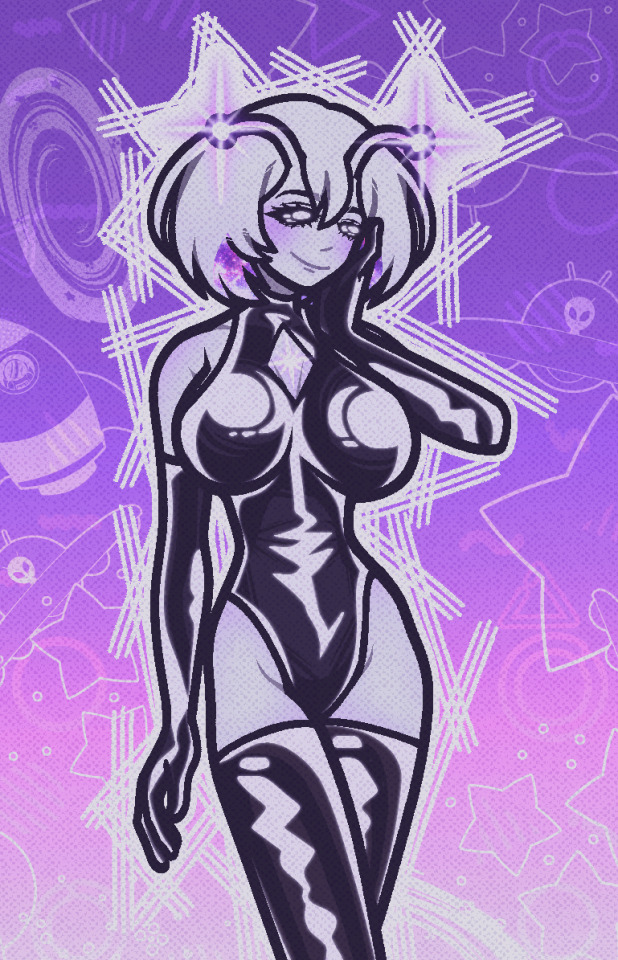
NAME: Star
HERO NAME: Star-Spinner (Ironic, I know)
Age: 18-19
This is gonna be a long read,
Essentially seeing as to how wide and open OPM's worldbuilding is, 'Star' is essentially god's irreversible creation. Formed initially as a thought, but made into reality as a mistake. She was born out of an egg that landed within earth and scientists found and decided to observe.
Nothing in the database tracks back of anything similar to her DNA, because she didn't even have a species of a planet full of what she is. She was an offspring of a being that barely anyone knew was watching and present.
Of course, she had a limiter despite being that said offspring of an ominous god.

She wasn't a humanoid, she was born as a bug-lizard type of creature from the egg until the more she grew up within the planet full of humanoids; her body adapted. She grew much like how a human girl would, the scientists gave her limited access to media, basic education.
I had plans that Bang was the one who busted her out of that crummy laboratory (Explains the dojo outfit) because 1.) It ran underground, without the knowledge of the government 2.) illegal experimenting on creatures and even people, monsterization, force psychic abilities, you name it.
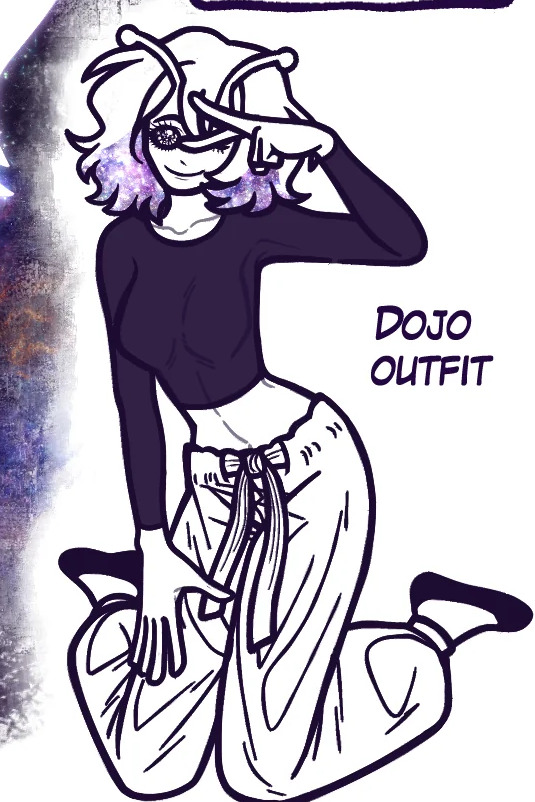

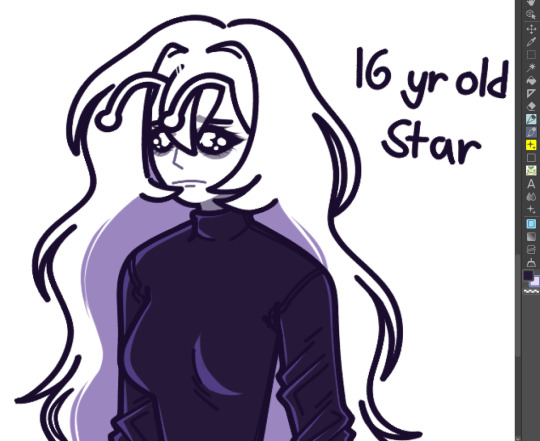
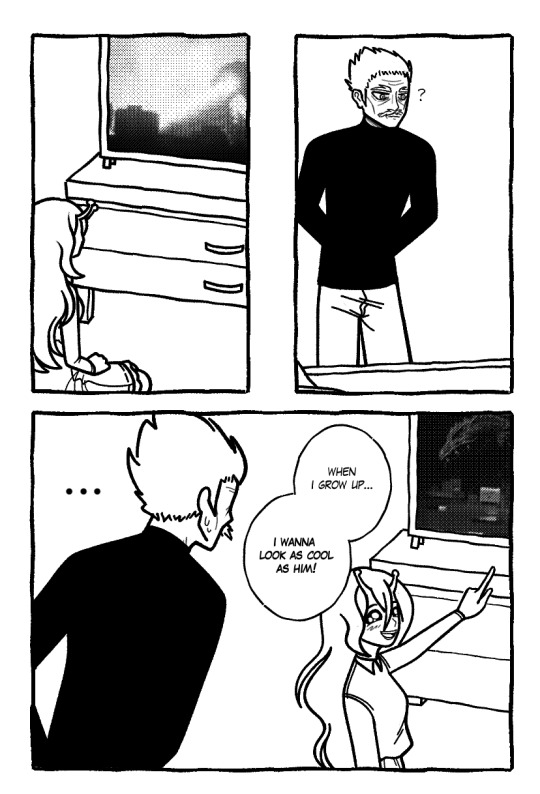
I got inspired by ONE's MP100, I like how Mob was written as a character so I made someone similar.
Star's essentially a psychic with very potent abilities. She has an internal struggle because she really cares about life that was around her, the only time she'd be hurting someone with her psychic abilities is when she fights monsters/villains. But Star easily sympathizes if ever she meets a human monster with a heart.
Life nurtured her, she's found herself with people that care about her and saved her from the hell that was the laboratory. So of course, she nurtures it back, the result of her past being cruel influenced Star to a pacifistic mindset in hopes that no one has to go through the same type of struggle.



=============================
Now, for the dynamics
I NEVER had lore for her, and I only used her for OCxCanon stuff. But here I am, taking back my word 😁
The monster that wants to be a human, and the human that wants to be a monster. That was what Garou and Star was, despite being opposites they got along and related to each other after receiving the world's cruelty. Garou took a strange attachment for Star mainly for the reason that she looked like a monster at first.
Unbeknownst to her, Star was a pillar for Garou and his goals to become the ultimate evil. And vice versa for Star that wanted to be a hero. They were practically two peas in a pod until Garou decided to just end their dynamic when he beat up every student in the dojo.
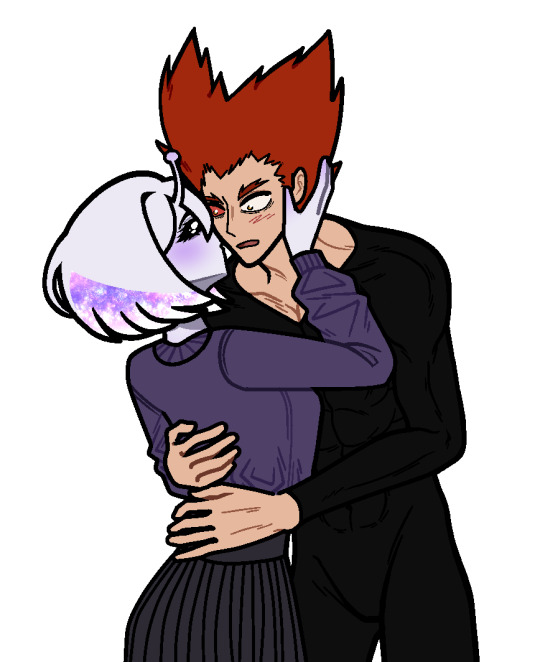

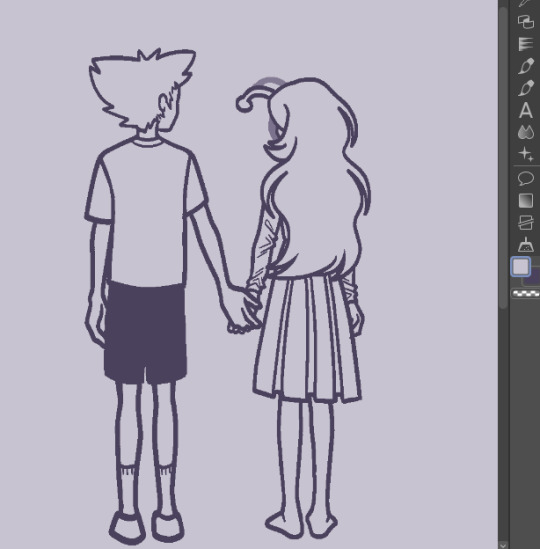
So there was that, they didn't see each other for a while. Star became a hero, of course not without Silverfang himself worrying for his adoptive kid getting hurt in the hero biz. But eventually it worked out when she proved herself to be capable out there.
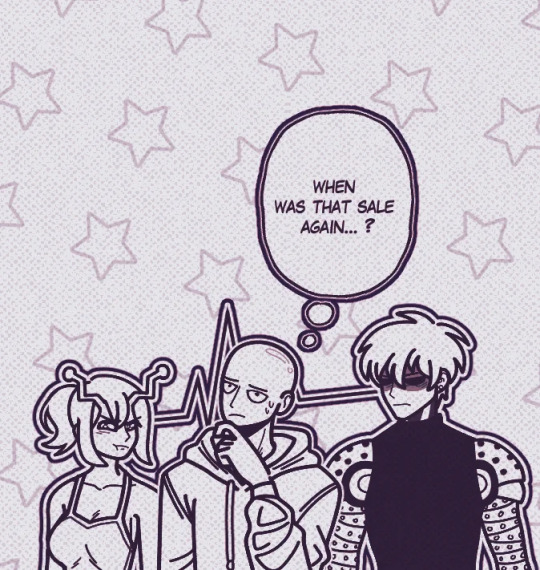
Did I mention she persisted Caped Baldy Saitama to take her as a disciple? Yeah, important part of her development
During her time in Hero Association she actually witnessed Saitama's feats, several of it. Like Genos, she came off a bit stalker-ish. But she became an apprentice later on after Genos did, she thinks Saitama could be the key to being a better hero and save the innocent. ( I asked criticism from my friends and partner that read OPM as well, gave me the greenlight. )
I do believe that Saitama wouldn't take another apprentice, so in the story I made it that it's in the early arcs that she followed him around and was a little pushy
I think to add a comedic effect she'd offer to cook good meals or even do chores in return of being his apprentice so maybe that's the way Saitama agreed to it in the first place. ( Genos and Star were really just stray cats he took in LOL )


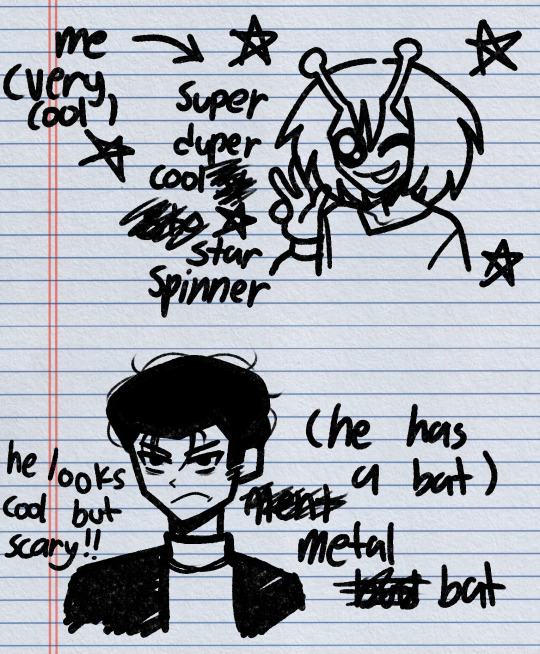

Oh yeah, and her journals she writes/doodles on. She and Genos are rivals that are complete opposites. (Mirror Maiden is my friend's OC)
#one punch man#one punch man OC#OC x Canon#opm oc#Saitama#Garou#Genos#i hope my reach is kind to me i really wanna share her character with y'all#i worked hard do u like it#OCposting
21 notes
·
View notes
Note
how is what's happening in Sudan a genocide?
In order to understand what is going on in Sudan currently, you have to do your research from past to present -I highly recommend you look into this in order to contextualize the RSF (which stands for Rapid Support Forces, which are a genocidal militia in Sudan with its own history) -they are the one's largely responsible for mass killing Sudanese people, sexually assaulting and violating Sudanese women, and destroying communities/villages because the RSF are at 'war' with SAF (which stands for Sudanese Armed Forces) for power and control of Sudan. I shared a video that VOX covered about this if you want to look under the hashtags on my page as well.
A brief, historical context (which of course is not all-encompassing):
youtube
EU condemns Darfur violence and warns of 'another genocide'
Sudanese RSF committing genocide in Darfur
Sudan: New Mass Ethnic Killings, Pillage in Darfur
These are not extensive resources (as the articles I provided are updates about the situation in Sudan) but these are a start. I am also not an expert on Sudanese history, to be clear. If you have access to a public library or a computer, there are journal articles and resources from people who will have information for you to read. I am not sure if you are familiar with JSTOR, but there are many articles that are free, but those that aren't for you to view; if you are able to find contact information by the researcher/person who wrote the article and request a copy to read, most of the time they will send you it. This is also only one scholarly journal article reference, as there are mountains of journals depending on the topics and critical field of study one is writing for/is researching. There are dozens, for instance, related to African Studies, History, the Humanities, Sociology, and Political Sciences, and so forth.
These are a handful of people in Sudan/are Sudanese who have been covering current events or have provided information to the international community -you can also follow and support on X/formerly known as Twitter:
@/ tootahalata
@/ BSonblast
@/ iTsAnToOny
@/ Kandakat_alhaqq
@/ NasAlSudann
I would also like to state as well that Sudanese people can be killed for talking about their experiences -their phones can be easily confiscated and many have already be subject to violence and death for trying to share their stories (they are also being censored on X in various respects as well, and it is horrifying). If you following the hashtags I included below, you will also be able to look into this more.
As always, Free Sudan!
#feminist#feminism#social justice#free sudan#sudan#keep eyes on sudan#eyes on sudan#eyes on darfur#darfur#sudan genocide#liberate sudan
49 notes
·
View notes
Text
Supernatural (2005) through the lens of narratology, recent roundup
Wikipedia: Narratology is the study of narrative and narrative structure and the ways that these affect human perception. [...] Cognitive narratology is a more recent development that allows for a broader understanding of narrative. Rather than focus on the structure of the story, cognitive narratology asks "how humans make sense of stories" and "how humans use stories as sense-making instruments".
Supernatural is a very attractive media franchise for narratologists. There are quite a few papers that include narratological analysis of Supernatural and related phenomena, such as narrative perception in fandom. Here are some from the past decade. I'll continuously update this if I find more.
Favard, F. (2018). Angels, demons and whatever comes next: the storyworld dynamics of Supenatural. Series - International Journal of TV Serial Narratives, 4(2), 19–26. https://doi.org/10.6092/issn.2421-454X/8164 (full text, pdf button hidden towards the bottom of the page)
Herbig, Art; and Herrmann, Andrew F.. 2016. Polymediated Narrative: The Case of the Supernatural Episode "Fan Fiction". International Journal of Communication. Vol.10 1-18. http://ijoc.org/index.php/ijoc/article/view/4397 ISSN: 1932-8036 (full text, pdf)
García, A. (2016). A Storytelling Machine: The Complexity and Revolution of Narrative Television. Between, 6(11). https://doi.org/10.13125/2039-6597/2081 (full text, pdf button hidden towards the bottom of the page)
Wilcox, R. V., Abbott, S., & Howard, D. L. (2018). A tribute to David Lavery: Television canon, television creativity. Critical Studies in Television, 13(4), 455–469. https://doi.org/10.1177/1749602018799246 (restricted, webpage)
Theological narrative
Nosachev, Pavel. 2020. "Theology of Supernatural" Religions 11, no. 12: 650. https://doi.org/10.3390/rel11120650 (full text, webpage)
Fandom narrative
Boni, Marta, and Valentina Re. “The Monster at the End of This Book.” Essay. In World Building: Transmedia, Fans, Industries, 321–42. Amsterdam, North Holland: Amsterdam University Press, 2017. (full text, pdf)
Rouse, Lauren. 2021. "Fan Fiction Comments and Their Relationship to Classroom Learning." In "Fan Studies Pedagogies," edited by Paul J. Booth and Regina Yung Lee, special issue, Transformative Works and Cultures, no. 35. https://doi.org/10.3983/twc.2021.1911. (full text, webpage) @transformativeworksandcultures
73 notes
·
View notes
Text
Mayor Nakano’s newest project sparks legal battle - GCCPS
Earlier this evening this journal was made aware of a new issue arising within our beloved city’s government. The culprit? Mayor Christopher Nakano’s (see related articles) newest passion project, the newest government devision; Gotham City Child Protective Services.
Gotham City Child Protective Services, or GCCPS (see related articles), was put in place after the disbandment of its predecessor, Gotham City Protection Services (see related articles), after the city’s municipal government, under Mayor Nakano, found it to be in violation of multiple laws (see related articles).
This includes, but is not limited to, several charges of fraud, potentially human trafficking, alleged child exploitation, alleged human experimentation, and child abuse and abduction. And while this journal applauds Mayor Nakano for removing this plague on the family’s of this city, we are beginning to question how well he thought this decision through.
Since the activation of GCCPS nearly a month ago, they have removed several children from homes without, what seems to be, legal grounds to do so. At the very least without any proper information prior to the child’s removal.
One family to have a child removed, The Gordon’s (see related articles), are attempting to fight this decision in court alongside several other children who were recently removed from their homes. We sent our intern to interview Ms. Barbara ‘Babs’ Gordon (see related articles) ( @babsggordon ), elder sister of the child removed, Julian Gordon ( @the-other-son-of-james-gordon ). Here is what she had to say -
“ Q: Please clarify the situation you and your family are in in regard to GCCPS ”
“ A: My family has been deeply afecteds by the recent mannage of the organization. The organization has taken a biological family member out of their home to be put in the struggles and inestability of the system. ”
“ Q: Do you believe them to be a valid organization? ”
“ A: No, there's no public means to contact the organization and on behalf the lack of the proper public information should have available for the general public. ”
“ Q: Do you believe your father to be guilty of those crimes? Do you believe them to be crimes at all? ”
“ A: According to the U.S Child protection law, these reasons are invalid. For three principal reasons:
I. The are missing the fellow paperwork, neither I or my father, Mr. Gordon has received the proper notice approved by the legal means
II. The subject and declaration to take a kid from their home, (in this case Julian J. Gordon) by negligence in the excuse for a severe addiction requires a police statement and in the case of legal subjects as tabaco or coffee, a medical diagnosis of addiction. Mr. Gordon don't present either of them. The medical archives of Mr. Gordon ARE public information due to his job as Police Comissioner.
III. The prohibition of communication with his family is an attempt against Julian and his family rights, considering they are his biological family no organization are authorized to restrain the communication with the immediate family as parents or siblings. ”
“ Q: What would be your words to Mayor Nakano in regard to this situation? ”
“ A: Mayor Nakano, with all the due respect I demand the respective clarifications of the recent movements in all the respective public organizations. Most of them are missing and it's a major problem it should be resolved as soon as possible. ”
“ Q: How would you fix the current adoption system within Gotham? ”
“ A: It's a big question to resolve just in a few words, but I would suggest that the organization openly collaborates with the Thomas and Martha way foundation. Raise the funds in public orphanages. And keep the investigation about the protectors of the children to the protectors and not stress the children by intrusively take them out of their homes. ”
When later asked if she and her family would further this lawsuit if Mr. Gordon was returned, she responded with -
“ Absolutely. ”
While we were unable to contact Mayor Nakano on this situation, there has been a recent update as there is now a way to contact GCCPS as well as many other factions on the Gotham City Municipal Government via their newly created social media account ( @gotham-city-municipal-government ).
We are unsure if Ms. Gordon and her lawyers were made aware of this, or if it was even available when she was initially inquiring after the wellbeing of her brother.
Another group of affected, 5 children between the ages of 8 and 14 who have been living together under the care of their respective guardians, are also pursuing legal action, more on this story later (see related articles).
Though Mayor Nakano was not available for comment, we reached out to the Gotham City Municipal Government and GCCPS for statements on the matter. Solely the GCMG responded, here is what they had to say -
“ Due to the nature of our founding and the, admittedly rocky, transition of data from or predecessor GCPS, as well as the sheer number of reports against Commissioner Gordon, we are legally obligated to intervene.
Due to the nature of the reports (addiction, abuse, neglect, etc.) we found it prudent to remove Mr. Gordon from his home as a means of ensuring he not be in harms way.
While we do have some access to Commissioner Gordon’s medical logs, we were are unsure of their validity and are having our own personnel review his files, both with the New Jersey Medical System (see related articles) and with the GCPD (see related articles).
We do admit to there being a lack of clarity on this case on our part, and will happily discuss further details with the families affected. ”
Though inconclusive, this case is ongoing and will be closely monitored by this journal.
Let us know your thoughts on the topic (here)
Gotham Reports is certified in fair, reliable, and unbiased reporting
Part 2 of this story (here)
#gotham reports#gotham city#wayne enterprises#gotham news network#wayne entertainment#gotham news#gotham report#gnn#bruce wayne#batman#gotham city police department#gotham city municipal government#gotham city child protective services#gotham city child protection services#gccps#gcmg#christopher nakano
14 notes
·
View notes
Text
by NORMAN J.W. GODA
All of this made perfect sense to French Trotskyists and Maoists. Pro-Palestinian anti-Zionist organizations formed in France after the Six-Day War. They included university students who styled themselves as revolutionaries. Using the language of anti-colonialism still fresh from France’s ill-fated attempt to retain Algeria, these organizations also borrowed the legacy of the French Resistance, neatly turning the Israelis into the Nazis. French keffiyeh-wearing Communists complained of Jewish press control. “Palestine solidarity” events included distribution of the Protocols of the Elders of Zion. As Jewish writer Gérard Rosenthal put it in early 1970, “The problem of Israel is becoming a national problem.” Israel’s seasoned ambassador Asher Ben-Natan, who arrived in Paris in 1970, noted that relations with France had hit difficulties because “there exists also in France elements that have suddenly adopted anti-Israel attitudes.”
How did France’s Jews respond? By asserting their Jewishness without sacrificing their claim to France’s promise of universal dignity. “The world,” said Meïr Waintrater, the editor of the Jewish monthly L’Arche, in April 1970, “only likes dead Jews. . . . It is impossible today to open a newspaper without finding an article [that] gives Jews advice — which curiously resembles orders — on how to be Jewish or how to be French.” Later, in 1977, filmmaker Claude Lanzmann asked, “Why must the Jews feel obligated after Auschwitz to speak in [polite] language? To prove that they are really French? This language . . . is from the time of Dreyfus! It is the language [from] before the creation of Israel! If we are to protest, I ask that we do so as Jews!”
The chief vehicle of the French-Jewish campaign was the International League against Racism and Antisemitism (LICRA), formed in 1927 in reaction to the dreadful treatment of Jews in Eastern Europe after World War I. After World War II, LICRA countered racism as well, monitoring everything from apartheid in South Africa to the civil rights movement in the United States to the war in Vietnam to the treatment of Arab workers in France. For French Jews, anti-antisemitism and the fight against racism were both part of the struggle for human dignity. LICRA saw no contradiction between opposing racism and advocating the safety of the State of Israel. If the world was divided, it was not between the oppressors and the oppressed. It was divided into those whose rights to safety were respected and those whose rights were not.
LICRA altered its view on de Gaulle. He was still the man who, on June 18, 1940, had called for resistance to the Germans in the name of the universalism France represented. As LICRA president and former Gaullist intelligence officer Jean Pierre-Bloch put it, “We will never forget.” But Pierre-Bloch also noted publicly that de Gaulle “is betraying the Franco-Israeli friendship, not to [help] the Arab people, but to support the potentates who rule these people to their great detriment.” Understanding that the French policy encouraged Arab extremists to hold out for Israel’s destruction rather than work for peace, LICRA also led demonstrations of Jews and non-Jews in Paris and other cities against what Pierre-Bloch called “the scandalous embargo.” Meanwhile LICRA called for a Palestinian state — but without the PLO, whose terror operations disqualified it from any human-rights struggle.
LICRA’s writers, Jews and non-Jews, also tried to expose the antisemitic nature of anti-Zionism in their newspaper Le Droit de vivre. Didier Aubourg, who worked for Judeo-Christian amity in France, wrote in March 1970, “Of all the forces that threaten Israel, the Arab armies are far from the most fearsome. The most relentless enemy . . . is indeed antisemitism, the old antisemitism that no longer dares to say its name, but which, rebaptized as anti-Zionism, has never lost its murderous virulence.” Former member of the Resistance, writer, and curator Jean Cassou was more direct. Anti-Zionism, he said, was “a wonderful invention,” because it “allows everyone to be an antisemite in good conscience from now on.”
As for the PLO’s mask of humanism and progressivism, philosopher Anne Matalon noted in the spring of 1968 that “one would be justified in thinking” that the PLO “would recognize . . . the Israeli people.” Instead, the PLO resembled “a capricious child or psychopath” who insisted that history could be turned back. Could the PLO really pose as revolutionary? Jacques Givet, whose family was murdered in Auschwitz and who narrowly escaped death by jumping from a deportation train, said no. “Any apology for al-Fatah, however veiled,” he wrote in March 1969, referring to the PLO’s main group, “is by necessity an apology for genocide.” Unlike the anti-colonial terror in Algiers, Givet argued, “Free Palestine” was little more than a slogan wrapped in pseudo-revolutionary imagery to justify Israel’s destruction and the killing of Jews. François Musard, a member of the Jewish Resistance, identified Palestinian terror as “defiance of the most elementary rules of civilization.” It “strikes blindly in theaters, in markets, among innocent populations where their victims are more often women and children. It wants nothing more than ‘to kill a Jew.’”
20 notes
·
View notes